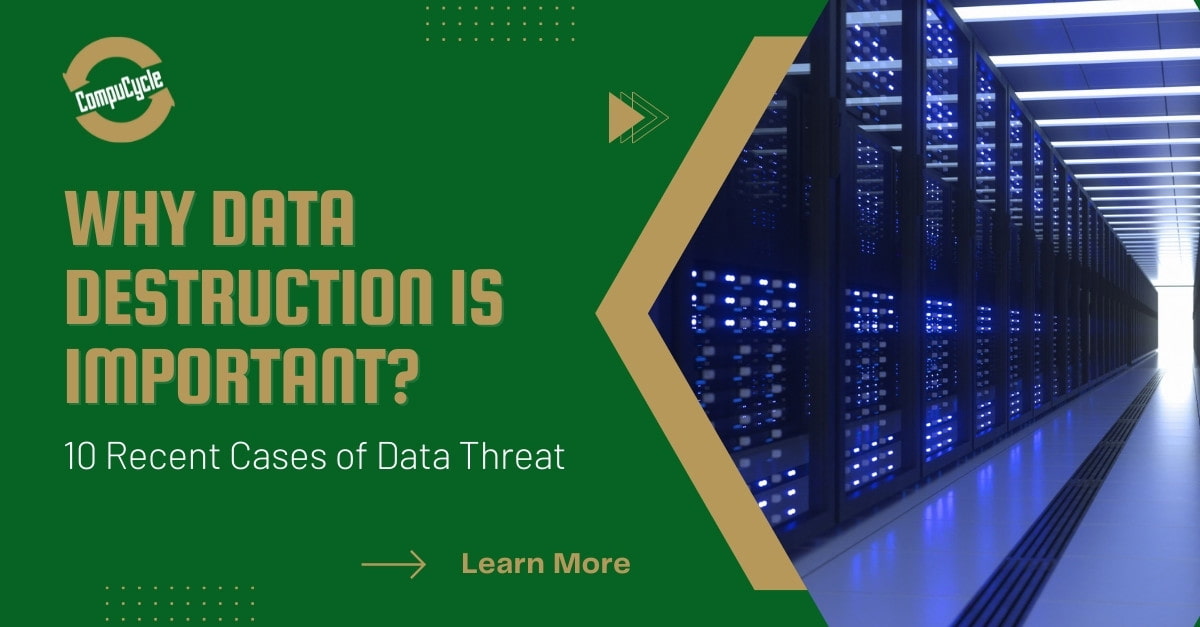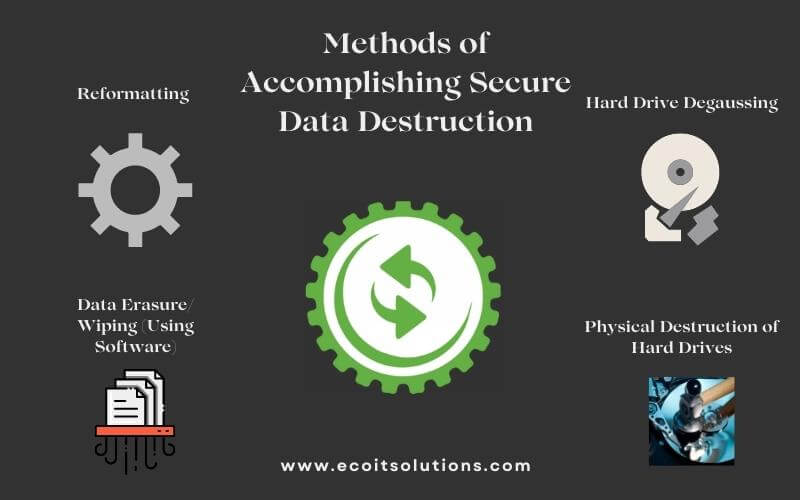Recognizing the Function of Data Destruction in Strengthening Cyber Security Defenses
Recognizing the Function of Data Destruction in Strengthening Cyber Security Defenses
Blog Article
The Important Nature of Data Devastation in Upholding Computer Protection Solutions and Protecting Versus Unauthorized Gain Access To
In an age where information violations and identification burglary are progressively common, the value of reliable data devastation can not be overemphasized. Different approaches, from data wiping to physical destruction, offer as crucial safeguards versus unauthorized gain access to.
Significance of Information Destruction
In a significantly electronic globe, the relevance of information devastation can not be overemphasized. As organizations generate huge amounts of sensitive info, the potential consequences of stopping working to correctly get rid of and handle of that information end up being increasingly serious. Data breaches, identity burglary, and business reconnaissance posture considerable threats, highlighting the need of efficient information devastation methods.

Moreover, as technology evolves, so as well do the approaches whereby destructive actors seek to make use of sensitive details. Organizations should stay aggressive and attentive in their data damage approaches to secure versus these developing threats. By focusing on data damage, companies not only shield their possessions however likewise foster depend on among customers and stakeholders, demonstrating a commitment to accountable information monitoring and protection practices.
Methods of Effective Data Damage
To guarantee the permanent and full damage of sensitive data, companies can use a selection of reliable approaches customized to their details demands. Among one of the most typical techniques is data wiping, which includes making use of specialized software to overwrite existing data multiple times, making recuperation basically difficult. This is especially valuable for disk drives and solid-state drives, where standard deletion techniques are inadequate.
One more effective approach is degaussing, which utilizes strong magnetic areas to disrupt the magnetic domain names on storage space media, providing the data irretrievable. This technique is particularly fit for magnetic storage devices, such as disk drive and hard drives.
Physical destruction is additionally a viable option, including the shredding, squashing, or incineration of storage space gadgets. This approach guarantees that data can not be recovered, making it ideal for companies managing highly delicate details.
Conformity With Data Defense Laws
Organizations must not only concentrate on reliable information damage approaches yet also make sure conformity with information defense policies that control just how sensitive details is dealt with and dealt with. Abiding by these laws is crucial for guarding personal data and preserving client trust. Laws such as the General Data Security Law (GDPR) in the European Union and the Health Insurance Mobility and Responsibility Act (HIPAA) in the United States you can try this out impose rigorous standards on information monitoring, that include requirements for the safe disposal of sensitive details.
To attain conformity, companies need to apply thorough data destruction policies that straighten with these legal structures. This consists of identifying information that calls for damage, developing procedures for safe and secure methodsâEUR" such as shredding physical media or making use of software program that fulfills industry standards for information wipingâEUR" and keeping detailed records of devastation activities. Regular audits should be conducted to guarantee adherence to these policies and to determine any possible locations for enhancement.
Failing to follow information protection guidelines can bring about considerable lawful implications, consisting of large fines and damage to a company's credibility. Incorporating compliance right into information devastation practices is not only a legal obligation however additionally an important part of a durable info safety strategy.
Repercussions of Poor Information Handling
Poor data handling can bring about serious effects that prolong beyond prompt operational troubles. Organizations may encounter significant financial losses as a result of information violations, which commonly cause pricey remediation efforts, legal fees, and regulatory fines. These financial implications can hinder and stress resources growth, ultimately affecting an organization's bottom line.
Moreover, poor data handling can badly damage an organization's reputation. Stakeholders, consumers, and companions might shed trust fund in an entity that falls short to shield sensitive info, resulting in decreased client loyalty and possible loss of service chances. This erosion of trust fund can take years to restore, if it can be brought back whatsoever.
Additionally, organizations can deal with legal ramifications developing from non-compliance with information defense regulations. Such infractions may lead to investigations and charges, intensifying the monetary problem and further staining the company's photo.
In the world of cybersecurity, insufficient information administration practices can produce vulnerabilities that make systems a lot more susceptible to unapproved access and cyberattacks. Ultimately, these effects highlight the vital relevance of carrying out durable information handling treatments to safeguard delicate information and keep organizational honesty.
Best Practices for Secure Data Disposal


To start with, data need to be identified according to its sensitivity. Sensitive information needs much more rigorous disposal techniques, such as shredding physical records and making use of sophisticated software program for electronic information cleaning. Employing certified information damage solutions makes certain conformity with sector policies and standards.
Secondly, companies need to apply a data disposal policy that mandates normal audits. This policy ought to outline the procedures for data retention and devastation, making certain that outdated data is disposed of immediately and securely. Educating employees on these protocols is important to cultivating a culture of safety awareness.
Last but not least, preserving thorough records of disposed information improves responsibility and gives a clear audit trail. This paperwork ought to consist of the kind of information damaged, the method used, and the day of disposal.
Verdict
Embracing robust methods such as data wiping, Read Full Article degaussing, and physical devastation, along with compliance with regulations like GDPR and HIPAA, is essential for safeguarding delicate details. Ignoring appropriate information disposal techniques can lead to serious effects, consisting of information breaches and lawful consequences.
In an age where information violations and identity theft are increasingly prevalent, the significance of effective information damage can not be overstated. data destruction. Read More Here Data violations, identity burglary, and company reconnaissance pose significant dangers, emphasizing the need of reliable information destruction practices
Compliance with policies such as GDPR and HIPAA mandates that organizations carry out stringent information defense measures, including the secure destruction of data at the end of its lifecycle.
By prioritizing data destruction, firms not just safeguard their possessions however likewise foster depend on among stakeholders and clients, demonstrating a dedication to liable information administration and protection methods.
Organizations need to not only focus on effective information damage techniques but also ensure conformity with information protection laws that control exactly how sensitive information is taken care of and disposed of.
Report this page